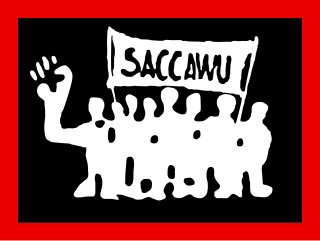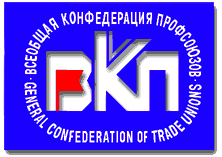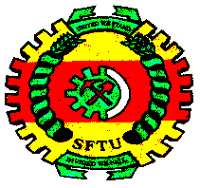
The World Federation of Trade Unions (WFTU) is an international federation of trade unions established in 1945. Founded in the immediate aftermath of World War Two, the organization built on the pre-war legacy of the International Federation of Trade Unions as a single structure for trade unions world-wide, following the World Trade Union Conference in London, United Kingdom.

The World Confederation of Labour (WCL) was an international labour organization founded in 1920 and based in Europe. Fascist governments of the 1930s repressed the federation and imprisoned many of its leaders, limiting operations until the end of World War II. In 2006 it became part of the International Trade Union Confederation (ITUC), ending its existence as an independent organization.

The South African Commercial, Catering and Allied Workers Union (SACCAWU) is a trade union representing retail, distribution and hospitality workers in South Africa.

The Food and Allied Workers Union (FAWU) is a trade union representing workers in the food processing industry in South Africa.

The South African Transport and Allied Workers Union (SATAWU) is a trade union in South Africa.

The General Confederation of Trade Unions or GCTU is an international trade union confederation. It was founded on 16 April 1992 and incorporates members from the Commonwealth of Independent States.
The Fiji Trades Union Congress (FTUC) is a trade union organisation in Fiji that was founded in 1952 under the leadership of Pandit Ami Chandra as the Fiji Industrial Workers Congress (FIWC). As the FIWC the organisation was the third federation in Oceania, after the Australian Council of Trade Unions and the New Zealand Council of Trade Unions, to join the International Confederation of Free Trade Unions. In 1975 the FTUC's membership was 25,000. The FTUC is affiliated to the International Trade Union Confederation. It has a close relationship with the Fiji Labour Party. The FTUC has 30 trade union affiliates, covering the public and private sectors. Major affiliates include: the Fiji Public Service Association, the Fiji Teachers Union, the Fiji Sugar & General Workers Union, the National Union of Hospitality, Catering & Tourism Industries Employees and the National Union of Factory and Commercial Workers Union.

The Hind Mazdoor Sabha (HMS) was formed by the Socialists in 1948 but has little real connection with the Socialist Party. It is one of the least political and most pragmatic trade-union federations in India. The HMS is affiliated with the International Confederation of Free Trade Unions.
The General Federation of Jordanian Trade Unions (GFJTU) is the national trade union center in Jordan. It was founded in 1954.

The Federation of Unions of South Africa (FEDUSA) is the second largest national trade union center in South Africa.

The National Council of Trade Unions (NACTU) is a national trade union center in South Africa.
The National Trade Union Centre of Trinidad and Tobago (NATUC) is a trade union federation in Trinidad and Tobago. It was created in 1991 by the merger of the Trinidad and Tobago Labour Congress (TTLC) and the Council of Progressive Trade Unions (CPTU). It has a membership of 100,000.
Trade unions in South Africa has a history dating back to the 1880s. From the beginning unions could be viewed as a reflection of the racial disunity of the country, with the earliest unions being predominantly for white workers. Through the turbulent years of 1948–1991 trade unions played an important part in developing political and economic resistance, and eventually were one of the driving forces in realising the transition to an inclusive democratic government.

The Swaziland Federation of Trade Unions (SFTU) was a national trade union center in Swaziland. It was founded in 1983 and dissolved into the Trade Union Congress of Eswatini (TUCOSWA) in 2012.

The Sweet, Food and Allied Workers' Union (SFAWU) was a trade union representing food processing workers in South Africa.
HOTELICCA is a general union in South Africa.
The Hospitality Industry and Allied Workers' Union (HIAWU) is a trade union representing workers in the hospitality sector in South Africa.
The Federal Council of Retail and Allied Workers (FEDCRAW) is a trade union representing workers in the retail sector in South Africa.











